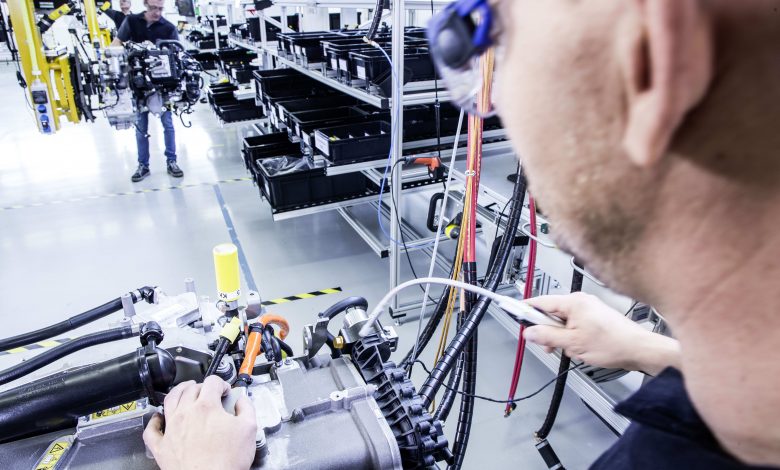Volvo Group and Daimler Truck team up to focus on fuel-cell technology

[ad_1]
An assembly line for a fuel cell drive unit in Kirchheim-Nabern, Germany.
Copyright Daimler
The Volvo Group and Daimler Truck have announced plans for a collaboration focusing on hydrogen fuel-cell technology, in the latest example of major transportation firms taking steps to push the technology into the mainstream.
In an announcement Tuesday the two firms said they had established a 50/50 joint venture, looking to “develop, produce and commercialize fuel cell systems for heavy-duty vehicle applications and other use cases.”
While the majority of road vehicles still use gasoline or diesel, the mix is changing, with electric and hybrid models becoming increasingly popular.
There are hopes in the industry that hydrogen fuel cells — not yet widely used in vehicles — will prove to be a useful tool when it comes to reducing transport emissions and boosting air quality within cities. The fuel cell combines hydrogen with oxygen, generating electricity, as well as water and heat as by-products.
For its part, the European Commission has described hydrogen as an energy carrier with “great potential for clean, efficient power in stationary, portable and transport applications.”
“Electrification of road transport is a key element in delivering the so-called Green Deal, a carbon neutral Europe and ultimately a carbon neutral world,” Martin Lundstedt, the Volvo Group’s president and CEO, said in a statement. Volvo Group makes trucks, buses and construction equipment, not cars.
“Using hydrogen as a carrier of green electricity to power electric trucks in long-haul operations is one important part of the puzzle, and a complement to battery electric vehicles and renewable fuels,” Lundstedt added.
The EU released details of its “European Green Deal” last December, describing it as a “roadmap” to make the bloc’s economy sustainable. One of the plan’s key aims is for the EU to become climate neutral by the year 2050.
The automotive giants noted that while they would be partners in the venture, they would remain competitors in all other areas of business.
They added that by working together, development costs would be reduced. “In the context of the current economic downturn cooperation has become even more necessary in order to meet the Green Deal objectives within a feasible time-frame,” they added.
There are some challenges when it comes to producing the hydrogen needed for fuel cells. As the U.S. Department of Energy has noted, hydrogen does not usually “exist by itself in nature” and needs to be generated from compounds containing it. A number of sources — from fossil fuels and solar, to geothermal — can produce hydrogen. If renewable sources are used in its production, it’s dubbed “green hydrogen”.
The technology is already being deployed in a number of scenarios. London, for instance, is already home to a number of hydrogen buses, while European railway manufacturer Alstom’s hydrogen-fuel-cell train started running in September 2018.
Major automobile manufacturers that have dipped into the hydrogen fuel cell market include Toyota and Honda, while smaller firms, such as Wales-based Riversimple, are also developing cars that use the technology.
Source link






